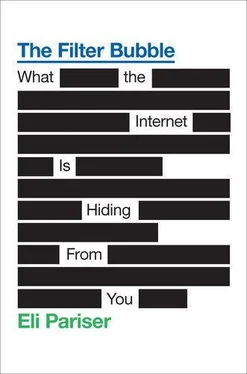“What I learned being in the ad business,” he says, “is that people can just go a long time without asking themselves what they should put their talent towards. You’re playing a game, and you know the point of the game is to win. But what game are you playing? What are you optimizing for? If you’re playing the game of trying to get the maximum downloads of your app, you’ll make the better farting app.”
“We don’t need more things,” he says. “People are more magical than iPads! Your relationships are not media. Your friendships are not media. Love is not media.” In his low-key way, Heiferman is getting worked up.
Evangelizing this view of technology—that it ought to do something meaningful to make our lives more fulfilling and to solve the big problems we face—isn’t as easy as it might seem. In addition to MeetUp more generally, Scott founded the New York Tech MeetUp, a group of ten thousand software engineers who meet every month to preview new Web sites. At a recent meeting, Scott made an impassioned plea for the assembled group to focus on solving the problems that matter—education, health care, the environment. It didn’t get a very good reception—in fact, he was just about booed off the stage. “‘We just want to do cool stuff,’ was the attitude,” Scott told me later. “ ‘Don’t bother me with this politics stuff.’”
Technodeterminists like to suggest that technology is inherently good. But despite what Kevin Kelly says, technology is no more benevolent than a wrench or a screwdriver. It’s only good when people make it do good things and use it in good ways. Melvin Kranzberg, a professor who studies the history of technology, put it best nearly thirty years ago, and his statement is now known as Kranzberg’s first law: “Technology is neither good or bad, nor is it neutral.”
For better or worse, programmers and engineers are in a position of remarkable power to shape the future of our society. They can use this power to help solve the big problems of our age—poverty, education, disease—or they can, as Heifer-man says, make a better farting app. They’re entitled to do either, of course. But it’s disingenuous to have it both ways—to claim your enterprise is great and good when it suits you and claim you’re a mere sugar-water salesman when it doesn’t.
Actually, building an informed and engaged citizenry—in which people have the tools to help manage not only their own lives but their own communities and societies—is one of the most fascinating and important engineering challenges. Solving it will take a great deal of technical skill mixed with humanistic understanding—a real feat. We need more programmers to go beyond Google’s famous slogan, “Don’t be evil.” We need engineers who will do good.
And we need them soon: If personalization remains on its current trajectory, as the next chapter describes, the near future could be stranger and more problematic than many of us would imagine.
7
What You Want, Whether You Want It or Not
There will always be plenty of things to compute in the detailed affairs of millions of people doing complicated things.
—computing pioneer Vannevar Bush, 1945
All collected data had come to a final end. Nothing was left to be collected. But all collected data had yet to be completely correlated and put together in all possible relationships.
—from Isaac Asimov’s short story “The Last Question”
Irecently received a friend invitation on Facebook from someone whose name I didn’t recognize, a curvy-figured girl with big eyes and thick lashes. Clicking to figure out who she was (and, I’ll admit, to look more closely), I read over her profile. It didn’t tell me a lot about her, but it seemed like the profile of someone I might plausibly know. A few of our interests were the same.
I looked again at the eyes. They were a little too big.
In fact, when I looked more closely, I realized her profile picture wasn’t even a photograph—it had been rendered by a 3-D graphics program. There was no such person. My new attractive would-be friend was a figment of software, crawling through friend connections to harvest data from Facebook users. Even the list of movies and books she liked appeared to have been ripped from the lists of her “friends.”
For lack of a better word, let’s call her an advertar —a virtual being with a commercial purpose. As the filter bubble’s membrane becomes thicker and harder to penetrate, advertars could become a powerful adaptive strategy. If I only get the news from my code and my friends, the easiest way to get my attention might be friends who are code.
The technologies that support personalization will only get more powerful in the years ahead. Sensors that can pick up new personal signals and data streams will become even more deeply embedded in the surface of everyday life. The server farms that support the Googles and Amazons will grow, while the processors inside them shrink; that computing power will be unleashed to make increasingly precise guesses about our preferences and even our interior lives. Personalized “augmented reality” technologies will project an overlay over our experience of the real world, not just the digital one. Even Nicholas Negroponte’s intelligent agents may make a comeback. “Markets are strong forces,” says Bill Joy, the legendary programmer who cofounded Sun Microsystems. “They take you somewhere very quickly. And if where they take you is not where you want to go, you’ve got a problem.”
In 2002, the sci-fi movie Minority Report featured personalized holographic advertisements that accosted pedestrians as they walked down the street. In Tokyo, the first Minority Report –style personalized billboard has gone up outside of the NEC corporation’s headquarters (minus, for now, the holography). It’s powered by the company’s PanelDirector software, which scans the faces of passersby and matches them to a database of ten thousand stored photos to make guesses about their age and gender. When a young woman steps in front of the display, it responds instantly by showing her ads tailored to her. IBM’s on the case, too; its prototype advertising displays use remotely readable identity cards to greet viewers by name.
In Reality Hunger, a book-length essay composed entirely of text fragments and reworked quotations, David Shields makes the case for the growing movement of artists who are “breaking larger and larger chunks of ‘reality’ into their work.” Shields’s examples are far-ranging, including The Blair Witch Project, Borat, and Curb Your Enthusiasm; karaoke, VH1’s Behind the Music, and public access TV; The Eminem Show and The Daily Show, documentary and mockumentary . These pieces, he says, are the most vital art of our time, part of a new mode characterized by “a deliberate unartiness” and “a blurring (to the point of invisibility) of any distinction between fiction and nonfiction: the lure and blur of the real.” Truthiness, in Shields’s view, is the future of art.
As goes art, so goes technology. The future of personalization—and of computing itself—is a strange amalgam of the real and the virtual. It’s a future where our cities and our bedrooms and all of the spaces in between exhibit what researchers call “ambient intelligence.” It’s a future where our environments shift around us to suit our preferences and even our moods. And it’s a future where advertisers will develop ever more powerful and reality-bending ways to make sure their products are seen.
The days when the filter bubble disappears when we step away from our computers, in other words, are numbered.
Читать дальше











